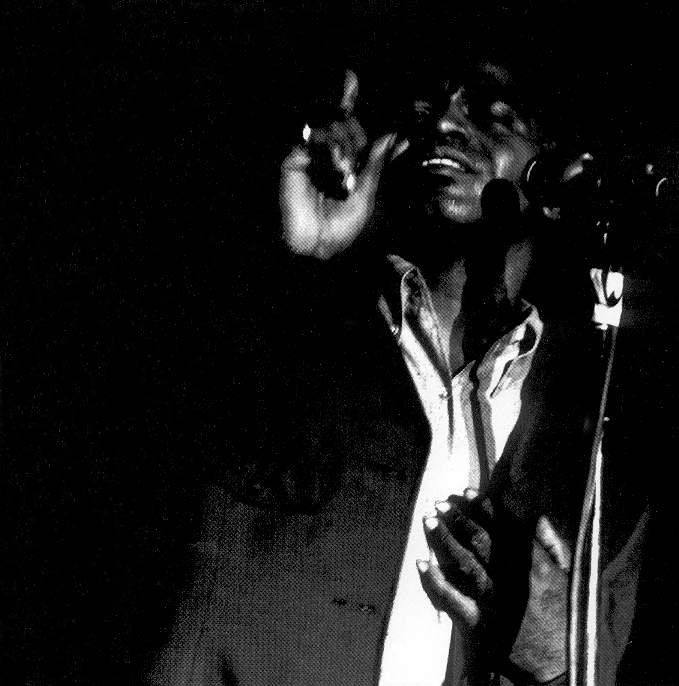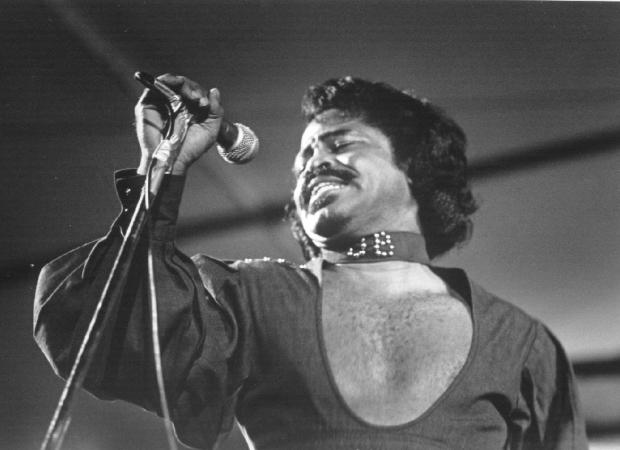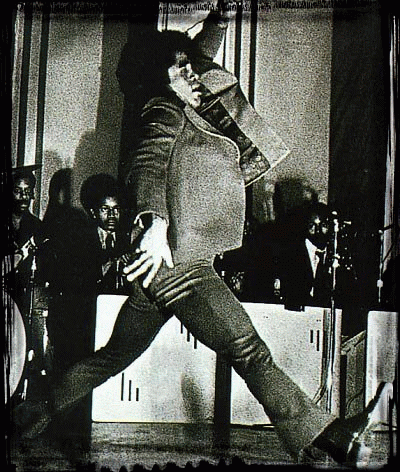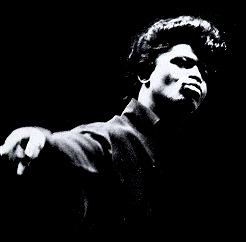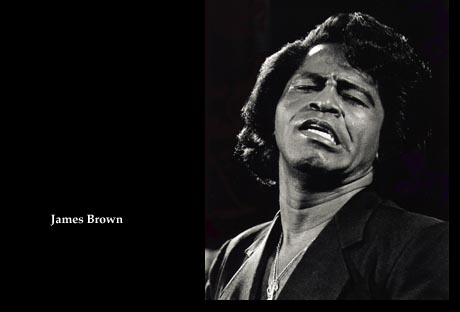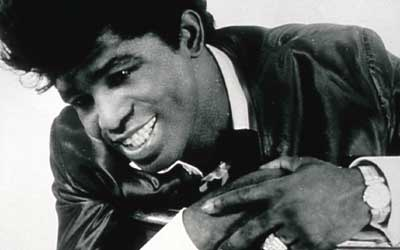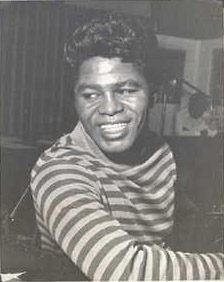Headlines | LoudMouth | Shows & Events | Hall of Fame | Interviews | Reviews | Multimedia | Klassifieds | Back Issues | Links | Myspace

|
JAMES BROWN
Over a 39 year period, James Brown amassed an amazing total of 98 entries on Billboard's top 40 R&B singles Charts, a record unsurpassed by any other artist. Seventeen on them reached number one, a feat topped only by Stevie Wonder and Louis Jordan, and equaled only by Aretha Franklin.
Brown's rise from juvenile delinquent to Soul Brother Number One is among the great modern day American success stories. The only child of a poor backwoods family, he was sent to Augusta, Georgia at age five to live at an aunt's brothel. He earned his keep by running errands for soldiers at nearby Camp Gordon, entertaining them with his buckdancing and enticing them into his aunt's establishment. Singing gospel music and playing piano, drums, and guitar served as an emotional outlet for the young Brown.
In 1952, Brown settled in Georgia and joined the Gospel Starlighters, a quartet led by Bobby Byrd. Theirs was a raw southern gospel style inspired by Julius Cheeks and the Sensational Nightingales and Reverend Reuben Willingham and the Swanee Quintet. Eventually, however, the Starlighters evolved into a rhythm and blues outfit. They were originally known as the Avons, them as the Flames.
In November 1955, while based in Macon, Georgia, the Flames cut a demonstration record at radio station WIBB of an original tune titled "Please, Please, Please". While passing through Atlanta, record producer Ralph Bass heard the demo and was so impressed with Brown's impassioned lead and the group's hard harmonies that he immediately drove to Macon and signed them to King Records, a Cincinnati company for which two of the Flames' favorite groups, the Midnighters and the 5 Royales, were recording. A session was held in Ohio the following week. Released on King's Federal label two months later, in March of 1956, "Please, Please, Please" reached Number Five on the Billboard's R&B chart.
Brown's boyhood dream of escaping poverty was not immediately realized, however. Although he and the Flames continued to make records for Federal, it would be nearly three years before they again hit the national charts. "Try Me", produced by Andy Gibson, hit big during the winter of 1958-59, giving the group its first Number One R&B record and enabling Brown to hire a steady backup band. Through grueling rehearsals and barnstorming onenighters, Brown developed the band into the hottest R&B unit in the land. His musicians' precision timing was geared to accent every blood curling scream, every flying split, every knee drop, every one-legged skate, and every shimmy of Brown's stunning array of acrobatics, which be now had become the visual trademark of the group's stage act.
While he continued scoring hit singles during the early 1960's, now issued on the King Label, Brown came up with the idea that if the hysteria he was generating in person could be captured on an album, people who hadn't seen him yet could at least hear and feel the excitement of him screaming and hollering until his back got soaking wet. King Records was convinced that such an album wouldn't sell, so Brown put up his own money to record a performance at the Apollo Theater in October 1962. Released nearly a year later, Live At The Apollo went to Number Two on Billboard's album chart, an unprecedented feat for a live R&B album. Radio stations played it with a frequency formerly reserved for singles, and attendance at Brown's concerts mushroomed.
Brown scored his first Top 10 pop single in 1965 with "Papa's Got A Brand New Bag", and the hits kept coming for the next decade, one after another at an unheard-of rate. He gradually phased out the Flames, and the gospel and blues structure of his early records gave way to open-ended vamps that emphasized his rhythmically riveting sandpaper vocals and the complex funk syncopations of his band. His innovations during this period had a profound influence on popular music styles around the world, including fund, rock, Afro-pop, disco and eventually rap.
James Brown's status as "The Godfather Of Soul" remains undiminished. Indeed, he has picked up a new generation of fans who have become familiar with his funk grooves through their frequent use as samples on rap records. A charter member of the Rock and Roll Hall of Fame, Brown added to his collections of accolades when he received a special lifetime achievement Grammy Award in 1992. Exactly a year later, he received a Lifetime Achievement Award at the 4th annual Rhythm & Blues Foundation Pioneer Awards.
In the spring of 1993 the residents of Steamboat Springs, Colorado voted to name a city bridge the "James Brown Soul Center of the Universe Bridge" which was official dedicated September of that year with Mr. Brown cutting the ribbon.
On January 10, 1997 Mr. Brown was honored with a star on the Hollywood Walk of Fame and on June 15, 2000, Brown was honored as an inductee for the New York Songwriters Hall of Fame. In 2006 Mr, Brown was inducted into the UK Hall of Fame cementing his international influence.
Over the years Brown's adopted hometown of Augusta has honored him for his music and well as for his philanthropy and civic activities.
On November 20, 1993, Mayor Charles DeVaney of the city of Augusta, Georgia held a ceremony to dedicate a section of 9th Street between Broad and Twiggs Streets, renamed "James Brown Boulevard," in the entertainer's honor. On May 6, 2005, as a 72nd birthday present for Brown, the City of Augusta unveiled a life-sized bronze statue of the singer on Broad Street. The statue was to have been dedicated a year earlier, but the ceremony was put on hold because of a domestic abuse charge that Brown faced at the time. On August 22, 2006, the Augusta-Richmond County Coliseum Authority voted to rename the city's civic center the James Brown Arena, and James Brown attended a ceremony for the unveiling of the namesake center on October 15, 2006.
Call him what you will, "The Godfather of Soul", "The Hardest Working Man in Show Business", James Brown will always be referred to as an innovator and a pioneer in the world of music. Often immitated, no over has ever come close to duplicating the magic of Augusta's own James Brown.
|
Contact Us | Advertise | About Us | Sponsors
